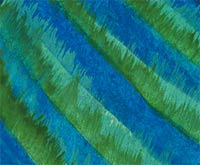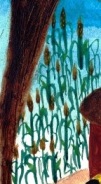Comparative genomics to improve cereal yields in high-aluminium and low-phosphorus soils
All in the family: Science and history working together
Did you know that crops can be clannish too?
Here's how and why. Comparative genomics is in essence about 'family' in the crop world, by bringing the best of genes from 'relatives' into play, in much the same way that we humans can share vital organs like kidneys amongst family members: investigating traits in one crop could provide vital clues and resources that will aid other kith and kin in the crop family.
Did you also know that in, er... recent history (at least in evolutionary terms!), all cereals were one but what we now call 'maize', 'rice' and 'sorghum' today separated out roughly 65 million years ago and evolved through time as their genomes changed?
It then follows that these 'evolutionary' cereals that we eat today sprang from a common ancestor, and therefore still have genetic similarities or near-similarities at some point due to their common ancestor.
In our time, crop genomics benefits from, and taps into, this common genetic bond from deep in history. The Comparative Genomics Research Initiative on cereals focuses on three major world cereals – maize, rice and sorghum. When two genes are related by descent from a common ancestral DNA sequence, genomicists refer to them as 'homologues'. Sometimes homologues are found within a single species, due to duplication within a genome – these are known as 'paralogues'. But the homologues that we are really interested in are 'orthologues': related genes found in different species thanks to their shared heritage. Orthologues tend to retain the same or similar functions across species – such as tolerance to a stressor in the environment a crop finds itself in. The stressor could be to do with soil conditions, such as too much aluminium or insufficient phosphorus.
Which are some of these environmental stresses and what does the Comparative Genomics RI do with 'genetic cocktail' above and these stresses?
 Aluminium toxicity and low phosphorus are the major factors that hamper cereal productivity in acid soils, especially in sub-Saharan Africa and South America. Tolerance to these stresses in different crops is often derived from the action of orthologous genes against that of distinctly different genes or gene ensembles.
Aluminium toxicity and low phosphorus are the major factors that hamper cereal productivity in acid soils, especially in sub-Saharan Africa and South America. Tolerance to these stresses in different crops is often derived from the action of orthologous genes against that of distinctly different genes or gene ensembles.
Cloning of these gene(s) will enhance our understanding on the mechanism of aluminium tolerance and phosphorus efficiency in cereals, thus speeding up the breeding to develop superior genotypes with enhanced tolerance.
Where we've come from...
This work stands on the shoulders of work done during GCP Phase I involving partners from EMBRAPA in Brazil, IRRI and Cornell University in the United States. Cloning the genes for aluminium tolerance in sorghum or for phosphorus uptake in rice opens up new avenues for their orthologues, i.e. their 'counterparts' in the other cereal species, to help mitigate these environmental stresses for, say, maize, or from sorghum to rice, or the other way around.
Have we managed to lose you, or made your head spin, with all these cross-species 'gene tours' across time and space? We hope not!
For greater clarity on this innovative venture, please follow the links in the sub-menu on the left of this page to learn more about our work in comparative genomics for cereals.
And if we may, a last word to put a more practical context to this work by providing a real example, and how this knowledge is then applied to crop breeding in a real-world setting out and away from the lab....

...and where we're going
During GCP Phase I, by screening a diverse panel of sorghum lines (varieties developed by breeders) and landraces (cultivated varieties found on farms), partners at EMBRAPA and Cornell successfully identified contrasting genotypes for aluminium tolerance and cloned a major gene for aluminium toxicity resistance in that important crop. In GCP Phase II, elite alleles for this gene have been identified and introduced into Brazil’s elite sorghum, and efforts are already underway to transfer this resistant Brazilian allele into African germplasm.
Facts, figures, feature stories, and more
Visit our Comparative Genomics InfoCentre for all the above, plus videos, podcasts and blogposts
Resources and networks
- Agricultural Genomics Network hosted on the Integrated Breeding Platform website.
- We invite you to 'shop' for free for genomic resources on our shelves through our Product Catalogue. Welcome!



